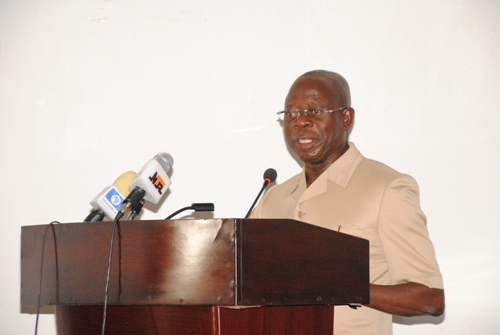
The former national chairman of the All Progressives Congress (APC), Adams Oshiomhole has warned that the current economic hardship in Nigeria could lead to social unrest.
Oshiomhole gave this warning while speaking at a recent Distinguished Personality Lecture hosted by the National Institute for Security Studies (NISS) in Abuja.
Speaking on the topic, “National Minimum Wage: Reward System and Productivity in Africa,” he also expressed concerns over wage exploitation in Nigeria, lamenting the impact it could have on national security and economic stability.
According to the former governor of Edo State, inadequate wages trigger workers’ dissatisfaction, decreased motivation, and susceptibility to manipulation and radicalization.
Oshiomhole also argued that fair wages are essential for boosting productivity and sustaining economic growth, pointing out how inflation has eroded the purchasing power of workers, leaving many of them financially worse off than previous generations, despite nominal increases in the minimum wage.
“Significant disparities exist between minimum and maximum wages across sectors, leading to dissatisfaction among workers. The wealthy often benefit from state protection, while the poor struggle,” he said.
“The minimum wage is designed to protect vulnerable workers but is often not enforced. Setting minimum wages too high can risk job losses while setting them too low can lead to exploitation.
“Inflation severely impacts purchasing power, making it difficult for workers to maintain a decent standard of living. Historical comparisons show that many workers are poorer now than in the past, despite nominal wage increases.”
Since the President Bola Tinubu-led federal government and the labour union agreed on N70,000 as the new minimum wage, many states have declared different amounts.
READ ALSO:Current economic hardship could lead to social unrest, warns Oshiomhole
Lagos State and Rivers are, however, still the highest with Governor Babajide Sanwo-Olu and Siminilayi Fubara approving the sum of N85,000 as the new minimum wage for their workers.
On the other hand, poor or common Nigerians have found it extremely difficult to survive under President Tinubu, who assumed office in Abuja on May 29, 2023.
The first decision Tinubu took upon becoming president was to put an end to the fuel subsidy, saying it’s era was gone.
His administration also made a controversial decision by overhauling the foreign exchange system in a bid to strengthen the naira.
However, these economic reforms, instead of improving Nigeria, have only brought about untold hardship for the citizens, especially the poor.
The removal of the fuel subsidy, which led to an increase in transportation costs, has had a negative effect on the prices of foodstuffs.






